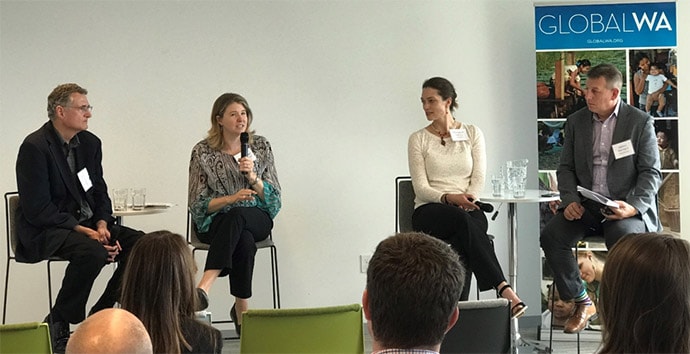By Ulrike Hoessle

Panelists in GlobalWA’s Future of Sustainable Sourcing event. From left to right: Ed Brooks, Advisor, Agriculture and Rural Markets, Mercy Corps; Robin Barr, Global Director, TFT; Margaret Henry, Director, Sustainable Agriculture, PepsiCo; James Bernard, Director, Resonance. (Photo Credit: Ulrike Hoessle).
From the coffee you sip in the morning, to the soaps you use, to the clothes you wear, the core components of many of the products you use every day come from all over the world.
On June 21st, Global Washington hosted an event to discuss how non-profits and for-profits can work together to improve sustainability in corporate supply chains. The event moderator, James Bernard, from consulting firm Resonance, reminded the audience in his opening remarks how globally interconnected our daily lives are.
Bernard framed sourcing in relation to the 17 Sustainable Development Goals, highlighting its cross-cutting influence. If sourcing is done well, communities thrive, as people have better access to decent jobs, better working conditions, health care, housing, and schools. At the same time, sustainable sourcing can ensure the natural environment is respected and preserved.
For the successful rollout of sustainable sourcing, partnerships between companies, communities and non-profits are crucial.
While sourcing individual products, such as tomatoes or potatoes, might be relatively easy and straightforward, it is more complicated with aggregated products, such as palm oil, as it is more difficult to trace them to their varied origins.
What is Sustainable Sourcing?
For Ed Brooks, Mercy Corps’ Agricultural Advisor, the goal of sustainable sourcing is best described with Mercy Corps’ mission statement: “Alleviate suffering, poverty and oppression by helping people build secure, productive and just communities.”
Just making money is not enough in developing countries; the well-being of the whole community needs to be addressed. Sustainable sourcing is also in the interest of the buyer, as communities cannot survive if they do not receive the resources they need to sustain themselves and their natural environment.
Robin Barr is the Global Director of The Forest Trust (TFT), which supports its members in developing sustainable supply chains for 18 product groups. TFT does not regard itself as a sustainable sourcing organization, but rather as an environmental and social justice organization. The non-profit uses supply chains as leverage points to address labor concerns, as well as to protect the health of natural ecosystems.
Margaret Henry, the Director of Sustainable Agriculture at PepsiCo, regards the term “sustainable sourcing” with some degree of skepticism. The definition depends on the issues someone cares about: water quality, human health, climate change, etc. For PepsiCo, sustainable sourcing encompasses all of these and more. While companies are excellent at managing their existing supply chains, they need partners to address systemic issues.
For Lynden International, which co-sponsored the event, sustainability is also about employee retention. A recent study showed that Millennials overwhelmingly prefer to work with ethical companies.
What Role Does Technology Play in Sustainable Sourcing?
Technology plays a crucial role in monitoring and verification at scale in the supply chain. Traditionally, auditors are sent out to the communities to talk to people and to assess a given situation, which can be very expensive and time-consuming. TFT started to explore scalable and credible monitoring systems, such as Starling, a remote sensing system developed by Airbus and SarVision, which can identify whether land clearing or erosion is taking place.
As remote sensing does not show whether labor laws were violated, TFT started to experiment with crowdsourcing information through an app-based monitoring system. The idea is to identify civil society or academic actors who can share through the App reliable information and its sources about the social aspects of the supply chain. Blockchain technology also might be used in the future to trace back and verify the single components of aggregated products.
What Are the Incentives for Farmers to Comply with Sustainable Sourcing Guidelines?
Farmers will participate in data collecting if the collection isn’t too onerous and they receive higher earnings as a result. In many cases, the buyer is willing to pay more if the farmer complies with sustainability standards, but in any case, it is important to give farmers a voice and listen to how they assess a problem and its possible solutions.
Ulrike Hoessle (WWS Worldwide) consults for companies on business & human rights and for non-profits on fundraising, organizational development and strategic planning. Previously, she worked for foundations and other non-profits on human rights, women’s rights and the environment in Africa and Latin America. Her Ph.D. in political science researched the outcome of the United Nations Global Compact, an initiative where more than 8,000 companies worldwide commit to uphold environmental, social and anti-corruption standards.